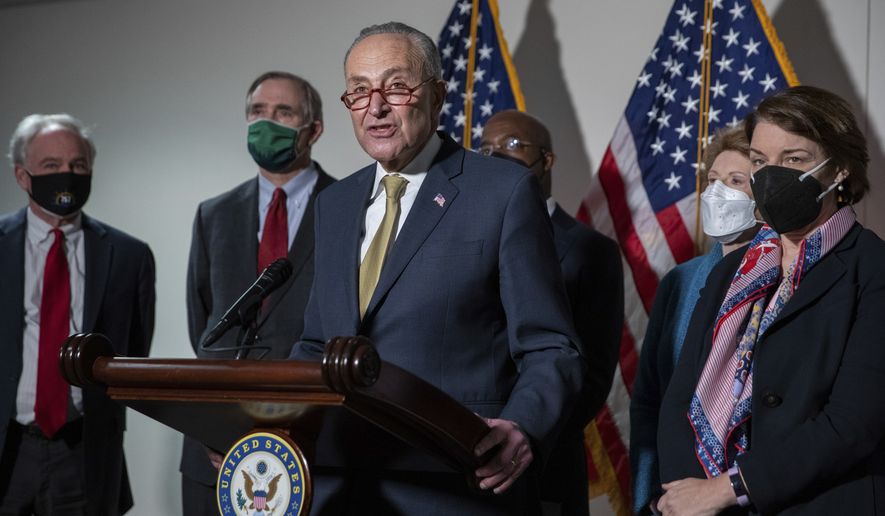President Biden’s push to rewrite the nation’s voting laws went down to defeat on Wednesday at the hands of a GOP filibuster, leaving Democrats pledging to hold a doomed vote to change the 60-vote threshold.
In a 51-49 vote, the Freedom to Vote Act and the John Lewis Voting Rights failed to garner the 10 GOP votes necessary to pass. Vice President Kamala Harris was on hand to preside over the vote.
“I’m here tonight because this is a historic night,” said Mrs. Harris. “This is about the fundamental freedom to vote and what should be unfettered access to the ballot … whatever happens tonight because of the outcome of this vote, the President and I are not going to give up on this issue.”
Shortly before the debate closed, Senate Majority Leader Charles E. Schumer changed his vote to oppose the legislation. Mr. Schumer, New York Democrat, did so to bring forward a proposal to remake the filibuster.
The change being pushed by Mr. Schumer would require lawmakers to mount an old-fashioned “talking filibuster” to hold up the legislative process. Under the proposal, the legislation would be eligible to pass with a simple majority vote once the speechmaking was exhausted.
Currently, lawmakers are allowed to merely object to ending debate, forcing leaders to round up the 60 votes to keep the legislation alive.
SEE ALSO: Manchin calls out Democrats for ‘misleading’ the American people about the filibuster
Mr. Schumer’s plan to change the filibuster is also expected to fail since any change requires the support of all 50 Senate Democrats.
That feat proved impossible after two moderate Democrats, Sens. Joe Manchin III of West Virginia and Kyrsten Sinema of Arizona, announced their opposition.
“I cannot support such a perilous course for this nation when elected leaders are sent to Washington to unite our country, not to divide our country,” said Mr. Manchin.
Both the Freedom to Vote and the John Lewis Voting Act were key components of the White House’s efforts to overturn state-level voter ID laws and other ballot integrity measures.
The Freedom to Vote Act, for instance, mandates that states offer same-day voter registration as well as automatic voter registration at local departments of motor vehicles. It also creates a taxpayer-backed public-financing system for House elections and imposes new restrictions on the ability of states to draw their electoral districts.
The John Lewis Voting Act would grant the Justice Department sweeping new powers to oversee state elections. In some cases, according to the bill, states would have to secure the DOJ’s approval before adopting new voting laws.
“As we have clearly laid out over the past two days, the laws passed in legislatures throughout the country do nothing less than to discourage and prevent certain kinds of Americans, black and brown Americans … from participating in the democratic process,” Mr. Schumer said.
Republicans defended the new laws in GOP-run states as measures that secure elections including voter ID laws and restrictions on mail-in ballots. They argued that Mr. Biden’s legislation would nationalize elections and is designed to give Democrats an edge at the ballot box.
“This party-line push has never been about securing citizens’ rights. It’s about expanding politicians’ power,” said Senate Minority Leader Mitch McConnell, Kentucky Republican. “It’s why their bill is stuffed with strange policies that have zero relationships to ballot access.”
Earlier on Tuesday, Mr. Biden warned that if his voting legislation failed to overcome a GOP filibuster the integrity of the upcoming midterms elections would be at stake.
“I think it could easily be illegitimate,” the president said. “The prospect of an illegitimate [election] is in direct proportion to us being able to get these reforms passed.”
• Haris Alic can be reached at halic@washingtontimes.com.




Please read our comment policy before commenting.